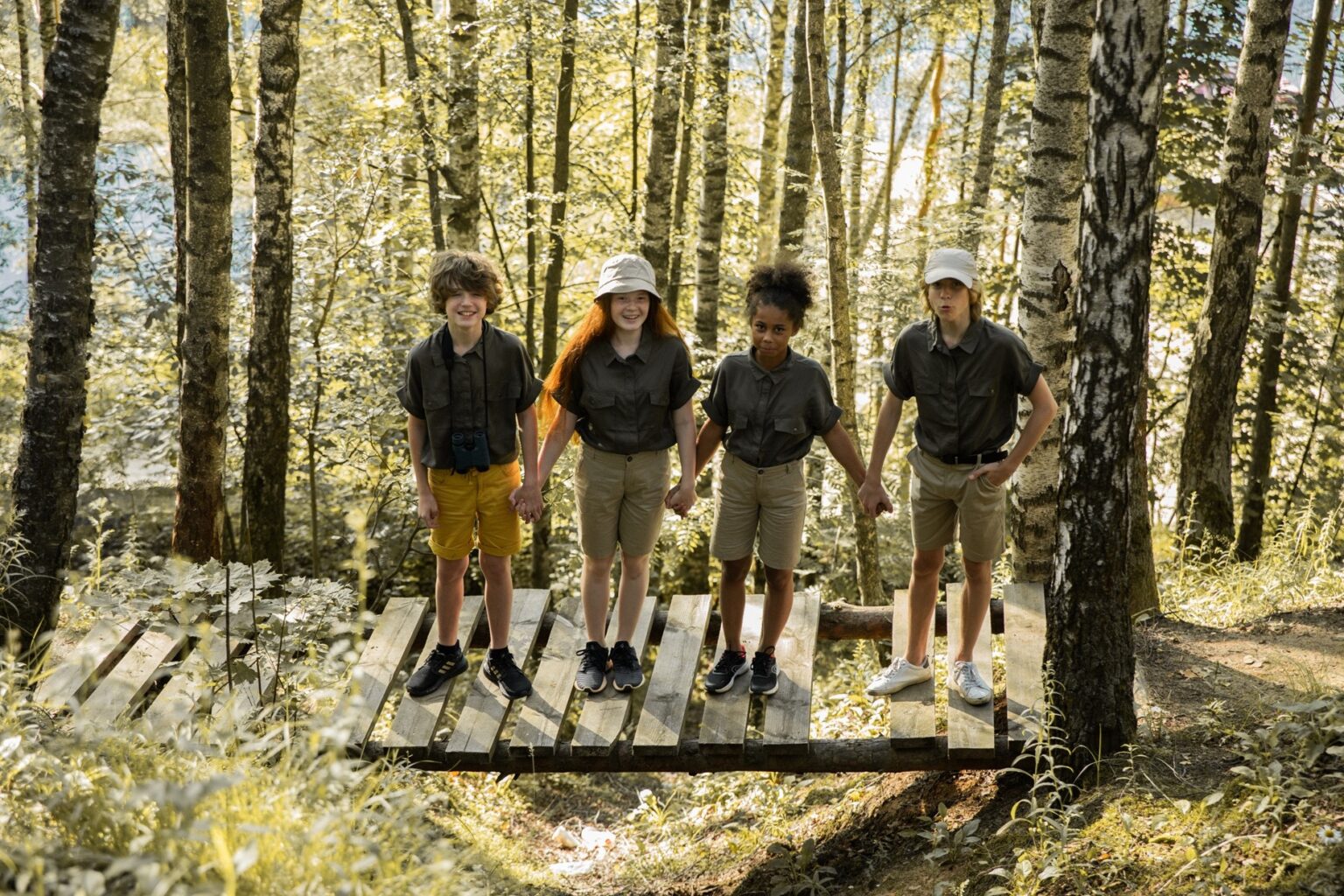
Topic Progress..
Overview of Topic 2.2 Regenerative Tourism Bringing Opportunities to ForestWell Initiatives offers a transformative approach for ForestWell tourism businesses to addresses climate change, health, and social crises. Unlike traditional sustainable tourism, which focuses on minimising harm, regenerative tourism seeks to restore and improve the environment and communities and the businesses themselves. It demonstrates how prioritising community involvement creates enriching, authentic experiences for both visitors and hosts, promoting a harmonious relationship between tourism and environmental stewardship.
Regenerative tourism provides a solution to tourism helping climate change. ForestWell combined with regenerative tourism provides an approach to tourism that helps answer the existential climate, health and social crisis we face. It enables ForestWell initiatives to move beyond mitigating damage (through managing energy, waste and water) and sets the stage for deeper, more meaningful and more sustainable engagement with places and communities. In so doing, it frames how forest wellness and tourism can credibly bring true additional value to the world by helping to transform places, people, health and create conditions for them to flourish.
“The planet cannot afford to resume previously unsustainable levels of tourism. These previous levels of tourism, the level of resources required to power it, and the emissions it produces are not consistent with the survival of the planet.” (Dianne Dredge, Regenerative Tourism and Design Thinking, Tourism Collab, 2021)
‘Its Tourism Businesses Responsibility to Implement Regenerative Strategies and Experiences. It is our responsibility as hosts to implement strategies and experiences that attract visitors who care for the region’s environment and cultural heritage and ultimately want to help it flourish’ (Source Kristin Dunne CEO at Tourism Bay of Plenty)
Adds great purpose to businesses and value to the environmentally eco conscious traveler. Regenerative tourism adds great purpose to ForestWell businesses where they can enhance and expand the important role they can play in today’s world. It provides an immersive low impact on nature while providing a healing experience through tourism which is a unique movement in itself. Regenerative practices allow ForestWell initiatives can further extend and improve their products and services so that they are closer aligned with the conscious traveler.
‘This can be done by developing products and experiences that align with conscious-travel and are shaped by traditional cultural values kaitiakitanga (guardianship and protection), and manaakitanga (generous hospitality and respect of cultural values), to ensure the region’s experiences are a natural fit with their environment and are entrenched in the rich cultural history’ (Source Kaitiakitang Guarandianship and Conservation)
Helps Communities Solve Their Challenges It recognises host communities’ right to be the primary agents in tourism. It helps communities solve their challenges through tourism. Communities can be empowered to answer the key question “What do we need to thrive and how can tourism help us achieve that?” Tourism may stop being something that happens to communities, but rather something that happens with them, by them and for them.
Regenerative tourism can help ensure the long term viability of natural and community resources are not just maintained but improved over time, securing the future of ForestWell’s operations. By focusing on restoration and regeneration, ForestWell can help build more resilient ecosystems capable of withstanding environmental changes and pressures. This can attract the ‘right type of environmentally responsible tourists and tourism’ attracting visitors that look for authentic, meaningful experiences that contribute to the well-being of the environment and local communities. At the core of regenerative tourism is the offering of deep, enriching experiences. This enhances both the visitor and community experience ensuring everyone benefits from tourism activities, thereby promoting inclusive development.
Regenerative community tourism should start and continue from inception to design, construction, and on-going operations. Regenesis suggests that ‘a business supports the achievement of this aim by building deep reciprocal and developmental relationships among the members of its business ecosystem, creating opportunities for all to flourish while contributing to the health of their local economy’. (Source Regenesis Group)
Deepens Connections Between Visitors and Community and Nature. It has the potential to deepen the connection between visitors, local communities and nature. It enriches the experience of both the visitor and the host in an authentic way.
“Outdoor Recreation and Environmental Concern: An Empirical Examination” by Dunlap and Heffernan, published in Rural Sociology explores the relationship between outdoor recreational activities and environmental concerns. The research found that ‘individuals engaged in outdoor recreation tend to develop a greater environmental awareness and concern. This is attributed to the direct interaction with nature, which fosters a deeper appreciation for natural environments and a desire to protect them’. (Source of Study)
(Source The Phenomenon of Regenerative Tourism: Transforming Travel for a Better Tomorrow)
Local Communities
Tourists
‘When businesses see the Earth, tourists and local communities as key stakeholders, they bring these considerations inside the purview of their economic activities, rather than separating them out as “externalities.” This opens up the possibility for tourism businesses to make contributions to the potential of the places in which they operate as an integral part of their work. With this kind of financial, human and business investment, places become more able to play their own value-adding role (that is, make their own contributions to potential) within larger regional systems and this helps them to secure their economic viability for their citizens’. (Regenesis Group)
Measurement of Success It provides a framework for defining new measures of success. The success of tourism as evidenced in GDP growth has held little meaning for the people and places where tourism actually occurs. A framing of tourism in regenerative terms opens the way for widening the definition to success, which would still include economic measures but also include measures such as well-being, community sentiment, landscape integrity and cultural prosperity’
(Source Tourism Space)
Recommended Reading: EU-Just-Transition-Fund-Tourism-Funding for Regenerative Tourism and Placemaking 2023 – 2026
Oasy Hotel, Tuscany, Italy has 18 individual lodges nestled in a WWF affiliated nature and forest reserve. Based on the values of environmental and social sustainability, Oasy Hotel is committed to the conservation and regeneration of natural areas, supporting their protection and promoting its enhancement. (Source Oasy Hotel, Italy)
(Source Trip Advisor)
Oasy Hotel offers an authentic, immersive nature and forest experience that allows one to explore the wealth of wildlife and biodiversity of the Apennine Mountains, meadows, and woodland. For the adventurous, there are ranger-led wildlife tours, mountain bike tours, trekking, kayaking and paddle, horse riding, and orienteering.
Promotes organic farming and local cuisine Adheres to traditional and sustainable agriculture. Guests experience picking seasonal fruits and vegetables in the organic farm. Its farm-to-table restaurants serve food inspired by Tuscany’s rich local cuisine. Giving back to the community Living by its ethos “Social responsibility, more than an impact, ” Oasy Hotel works with the Dynamo Academy, a project founded in 2007. where the hotel provides recreational therapy for children living with serious and chronic diseases.
Protects local biodiversity Was a 900-hectare hunting reserve before WWF Italia embarked on a conservation project that would transform it into the protected oasis it is now, is one of the region’s hotbeds of wildlife and biodiversity. Actively takes part in the protection and conservation of flora and fauna, agriculture, breeding, and scientific research
Giving back to the community Living by its ethos “Social responsibility, more than an impact, ” Oasy Hotel works with the Dynamo Academy, a project founded in 2007. where the hotel provides recreational therapy for children living with serious and chronic diseases’. (Source Earth Changers)
“Taking a holistic approach is essential for tourism businesses so they can understand the positive effects (e.g. healing) as well as unintended consequences (e.g. degradation). Everything is connected, and tourism that does not respect or understand feedback loops in the system in which it operates will ultimately erode capital – and with that the wellbeing and health of the system.” (Dr. Susanne Becken, 2020) Tourism regeneration and restoration offers a potential transition pathway towards economic regionalisation. Tourism is a glocal (global/local) industry by its very nature’ (Source Earth Changers)
(Source Trip Advisor)
Find More Regenerative Tourism Examples with Regenerative Travel.
